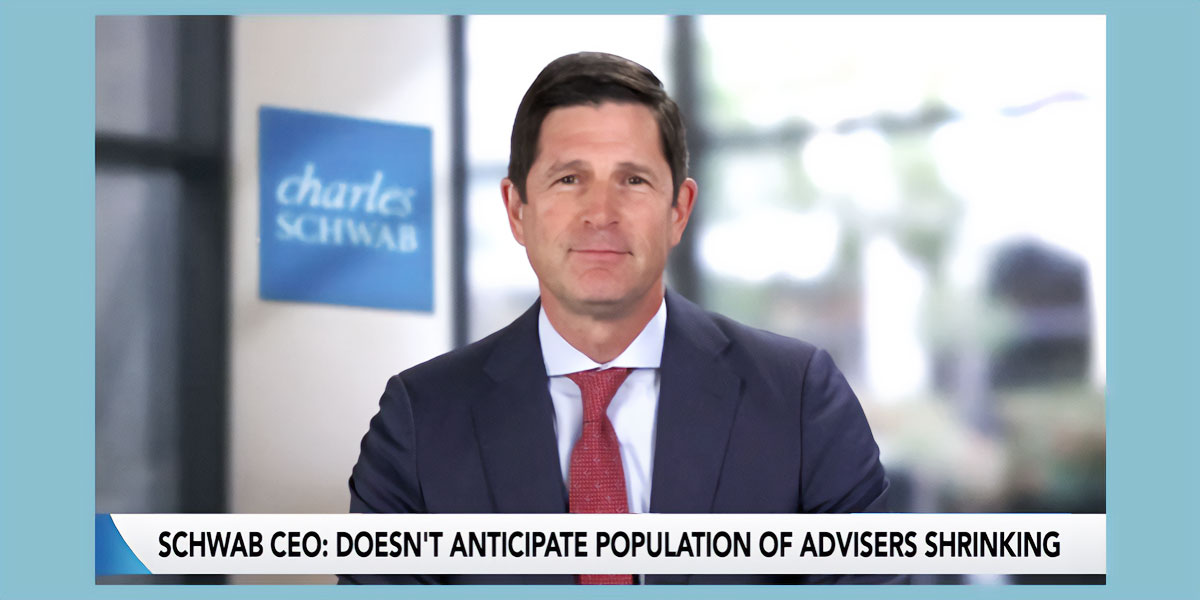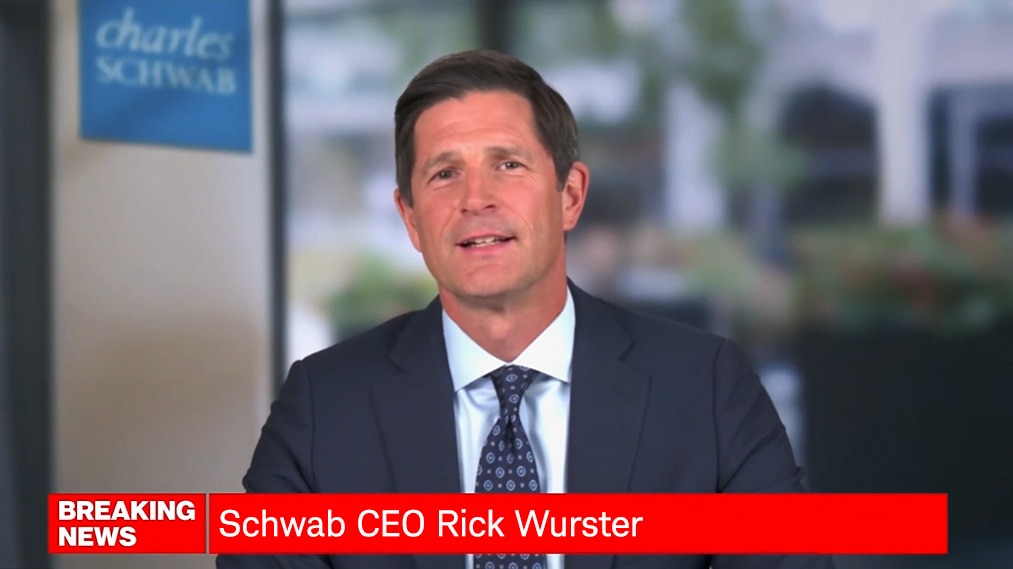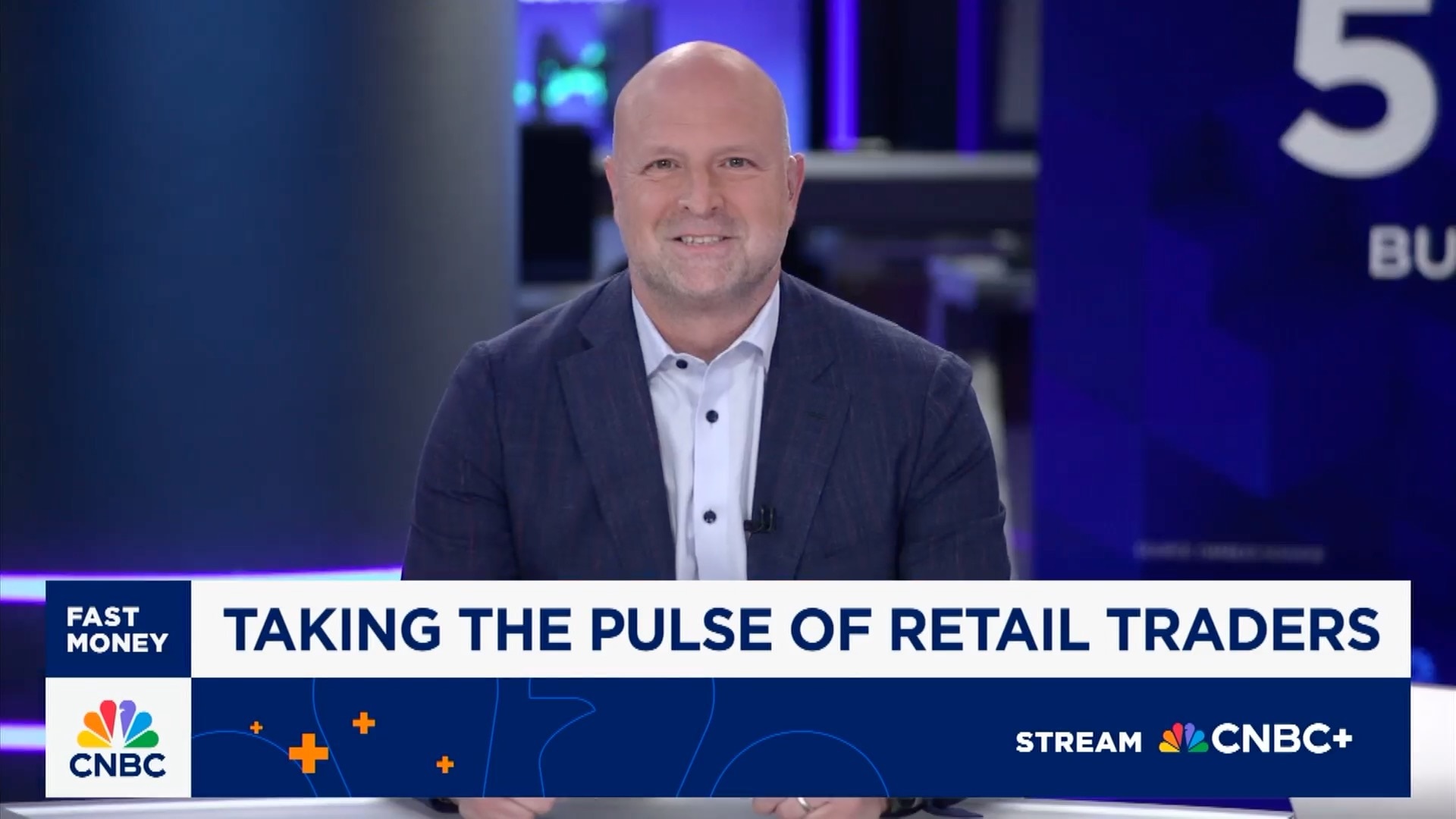Bloomberg TV “Businessweek”
January 21, 2026
Carol Massar: Here to talk about the quarter and the outlook, we are joined by the President and CEO of the Charles Schwab corporation. He joins us from Westlake, Texas. Rick, great to have you back with us. How are you?
Rick Wurster: I'm doing really well. Nice to be back with you, Carol and Tim. I always enjoy it.
Carol Massar: Well, we are so glad to have you back with us. It feels like 2026 is off and running. I’m just curious though, I want to talk about the last quarter. You guys did note about clients conducting a lot more of their financial lives at Schwab do two different things: wealth management, trading and banking. So, tell us more about how the quarter wrapped up and where you saw them engaging more.
Rick Wurster: It was a record quarter for us as a firm. Our earnings grew 50% year-over-year. Our revenue was up 22% year-over-year. And we saw net new client assets to the firm of $519 billion on the year including an all-time record quarter in the fourth quarter of $163 billion. And importantly, what we’re seeing is a bull market for convenience, not just in financial services, but I think across most industries. The way that reflects itself for us is a desire for clients to have more of their financial life conducted with one institution. We’ve become the institution for many clients that they’re turning to. We can help with investing needs. We can help with training needs, with their wealth needs, banking and lending needs. And so by bringing together a client's financial life, we’re able to help them more. When we do that, their satisfaction actually increases and our business grows. So, it is a win for them, because we are bringing convenience and it’s a win for us because we are doing more business with them and more to help their financial lives.
Tim Stenovec: You mention financial lives and you just went through a list of things people do with these apps and services. What about prediction markets? Can you talk a little bit about whether you are exploring options for customers, when it comes to prediction markets? It’s all the rage right now, as you know.
Carol Massar: And you thought we were going to warm you up. We are going right in.
Rick Wurster: I love it, let's dive right in. First, I’d distinguish between prediction markets and gambling. To me, prediction markets and the way they started were about being able to forecast, like employment or inflation, and being able to take a position on those, and that could somehow hedge or accentuate the positions in your investment portfolio. I think as those were born, I think that makes sense within the context of an investment portfolio. And we are absolutely open to having that on our platform, those types of prediction markets. At the moment, it is not high on our clients’ list of things they want us to innovate for them, so we have focused our innovations in other areas that are of more interest to our clients. But I'd distinguish between that and sports gambling. If you look at 95% of the volume of what people call prediction markets, it’s actually just sports gambling. That is not something we are keenly interested in getting into for a very simple reason, which is, our mission as a firm is to make clients better off in their financial life. Less than 5% of people who go into one of these gambling apps take out more money than they put in in the first place.
Tim Stenovec: Wow.
Rick Wurster: That is the complete antithesis of what we do at Schwab. Our client’s wealth is at an all-time high. The level of advice we are giving them is at an all-time high and the amount we're doing to try to help them is at an all-time high. We will leave sports gambling, which constitutes 95% of prediction markets volume, we’ll leave that to the gambling houses to the FanDuals, the DraftKings, and the Robinhoods.
Tim Stenovec: So that’s funny, it is interesting that you say Robinhood, we’ll get back to that, because I think Robinhood would probably like to position itself as a competitor to a Charles Schwab in a lot of areas. If we stick with the 95% of what you believe the prediction markets are sports gambling, what is the 5% that is of interest to you that we could potentially see at one point on Schwab's platform? Give us some examples there.
Rick Wurster: Well, I think if you want to take a position on what the employment report is going to be at the end of the month or how inflation is going to print, those things could have an impact on your portfolio. If you have a big bond position, you may have interest in what is going to happen in the inflation report. And it is a simple way of taking a position based on a yes or no position and so that could be of interest to clients. But the reason why I think we have not seen much volume in those, and the reason why 95% of the volume is in sports gambling, is because if you want to take a position on the employment report or the inflation report, there are countless ways to do that. And financial market participants are already doing that, whether it’s in the bond market, futures market, through options. There’s plenty of ways to do that today. I think that’s part of the reason why the true idea of prediction markets really haven’t taken off, and why the firms that offer this have pivoted to sports gambling, because there is a lot more interest in that than there is in taking a position on the employment or inflation report.
Carol Massar: Okay then safe to say, Rick, that if you were a betting man, I would guess there is nothing in terms of a prediction market on the Schwab platform in the next year or so, or maybe never?
Rick Wurster: We have been innovating at a very fast rate. 2025 was all about how we meet the wealth, lending, and active trading needs for our clients. We had significant innovations in every one of those areas. We went to 24/5 trading for our active traders. We continue to make our mobile app even stronger for those that want to actively trade and do so via the mobile app. For our wealth clients, we have launched new tax, trust, and estate capabilities, including an investment in Wealth.com to bring trust capabilities directly to our clients. We launched a series of new capabilities for our advisor clients, and in particular really leaned into innovations around making it easier for them to work with us. All of those are things that are far more impactful to our clients’ ability to grow their wealth than prediction markets. When we go out and survey our clients about what they want from us, prediction markets are low on the list. It’s something we are actively looking at. I think at some point, in the future, we will have true prediction markets, but it’s just not high on our innovation list because we are firmly focused on those innovations that will have the most impact on our clients wealth.
Carol Massar: Right, unlike something we talked about when we were at Schwab IMPACT with you in November, that you had just done a deal that would give investors access to private companies, this was buying Forge Global. I get that’s more of a priority for clients?
Rick Wurster: Yeah, you go back to the 1980's, I believe it was KKR that did the first leveraged buyout. Institutions have been benefiting from the diversification and the return enhancement from alternatives investments. In the past decades, multiple decades, the really wealthy have also been able to participate in those return and diversification benefits, but the everyday retail investor has not been able to. Our Forge acquisition was really about democratizing investments and alternatives. We are now going to be able to bring it to all of our investors in multiple forms and allow him to participate in private markets the way institutions and the very wealthy have been able to. We are thrilled to bridge the gap and excited for what that could mean for our client's wealth.
Carol Massar: Hey Rick, one thing that we got to bring your attention to, it’s just a headline that just crossed Bloomberg. And we see markets turn around and rally pretty substantially on it. We see a straight move up on all the major equity averages. We’re now up nearly 1.2% on the S&P and up almost 1.4% on the Nasdaq 100. President Trump, who's in Davos and meeting with European leaders, says that he won't impose limited tariffs on February 1st on Greenland. The headline that I think really got markets moving, the president says he has a framework up for a future deal on Greenland with NATO. I guess I want to bring this into the conversation because I feel like when Tim and I, and you were together at Schwab IMPACT in Denver, it was pretty upbeat. I think about the market environment and the outlook and there’s been a lot that’s happened here in 2026. It feels like volatility is back. I'm just curious, have any of the assumptions about the White House and policy, and changes changed in your view? I’m just curious what you make of something like this from the president that has markets moving to the upside.
Rick Wurster: I don't think any of that surprises us. We are still within a percent or two of all-time highs in markets. I think there is going to be geopolitical noise from time to time. If you have read ‘The Art of the Deal’ I think it begins with starting big and you request and then negotiate to something that is workable for both parties. My guess is that maybe that’s the playbook that is followed here. For our clients, we are not seeing an undue amount of concern. This is the kind of environment in which we thrive. We are not just an investment app, we are so much more. We took 30 million calls last year and answered them in 30 seconds. We are in many local communities across the country with actual people that are there to help coach our clients on how to navigate periods like this, and how to see through the noise, and be diversified and stick with it for the long term, so they can build their wealth. Whatever markets and geopolitics bring, we will be ready for it. It will help to distinguish what we stand for here at Schwab, which is helping clients grow their wealth.
Tim Stenovec: You know, we had some reporting in recent days about the New York Stock Exchange exploring ways for 24/7 trading of certain assets. I am curious, crypto kind of paved the way for that because a lot of people can trade crypto 24/7. What do you think of the ability for people to trade stocks 24/7?
Rick Wurster: I think we are very open to that, we certainly would participate. We are already 24/5 today. We see very little client activity outside of market hours, usually only a couple percent. The vast majority of trading happens within the market hours. I think the market hours are a feature, not a bug. What I mean by that is by limiting the market hours, you draw people in at the same time and create a lot of liquidity, so spreads are tight and trading efficiency is very high. I think the convenience of tracking 24/7 is certainly very appealing, but we need to make sure those trades are done in a way that makes sense for clients. As we see clients trade on our 24/5 platform, we make very certain that they trade in a way that they are recognizing the higher spreads. We make that very clear to them. They live with that for the convenience, but we have to be careful as we go 24/7, that we don't lose the efficiency of the market and the benefits of getting everyone in the market at the same time, which is great for trading efficiency.
Carol Massar: Hey Rick, super quick, 10 seconds, it feels optimistic this year?
Rick Wurster: I think so. The economy is on strong footing, the market has been up three years in a row. Unless something changes, things look pretty good.
Carol Massar: Well, we certainly look forward to coming back to you throughout the year and checking in on it. Rick, thank you so much. Happy New Year. Rick Wurster, he is the President and CEO of the Charles Schwab Corporation, joining us there from Texas.
+++
This interview contains forward-looking statements relating to the company’s strategy and focus; momentum and competitive position; growth in client accounts and assets; and client sentiment and engagement. These forward-looking statements reflect management’s expectations as of the date hereof. Achievement of these expectations and objectives is subject to risks and uncertainties that could cause actual results to differ materially, including the company’s ability to close the acquisition of Forge on the anticipated terms and timing; required regulatory approvals and approval by Forge’s stockholders; disruptions to Forge’s business as a result of the announcement and pendency of the acquisition; and the ability and timeframe to integrate the business and realize the anticipated benefits. Other important factors that may cause such differences are described in the company’s most recent reports on Form 10-K and Form 10-Q, which have been filed with the Securities and Exchange Commission and are available on the company’s website (https://www.aboutschwab.com/financial-reports) and on the Securities and Exchange Commission’s website (https://www.sec.gov). The company makes no commitment to update any forward-looking statements.
Past performance is no guarantee of future results.
Investing involves risk, including loss of principal, and for some products and strategies, loss of more than your initial investment.
All corporate names and market data shown above are for illustrative purposes only and are not a recommendation, offer to sell, or a solicitation of an offer to buy any security.
Schwab mobile requires a wireless signal or mobile connection. System availability and response times are subject to market conditions and your mobile connection limitations. Functionality may vary by operating system and/or device.
This material is intended for general informational purposes only. This should not be considered an individualized recommendation or personalized investment advice.
All expressions of opinion are subject to change without notice in reaction to shifting market conditions.






